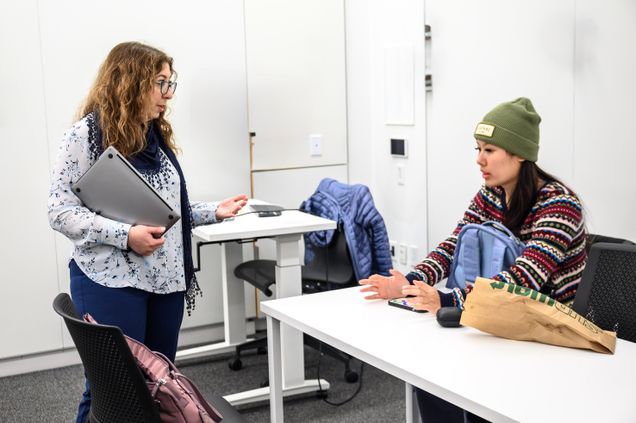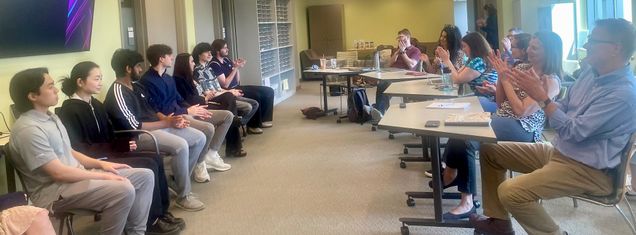Spotlight

For the past two years, the CAS Writing Program and CGS Rhetoric Division have piloted AI-intensive courses that encourage faculty and students to experiment with generative AI in ways focused on learning. Each pilot section was supported by an AI affiliate—an undergraduate who had already completed an equivalent writing course and was experienced with generative AI. This opportunity for faculty to partner with students was one of the most distinctive—and successful—parts of the project.
Throughout the semester, AI affiliates researched and tested specialized AI tools and consulted with instructors as they planned their classes, troubleshooting new exercises and modeling responsible uses. Through this experiential learning opportunity, they developed technical and communication skills that will be critically important in many fields in the near future. And by bringing together different realms of knowledge to address a current challenge, affiliates took “knowledge, ideas, and experience into action” in ways that exemplify the power of a liberal arts education.
“This semester, my experience as an AI writing affiliate fundamentally reshaped how I think about writing, teaching, and technology…. It changed how I understand the future of literacy.”
—Xia Puxin, AI affiliate
Last May, affiliates shared approaches they had developed in collaboration with their faculty partner at a showcase event that featured creative lesson plans on using AI to remix media, visualize an inner critic, explore research questions by adopting different personas and more. These materials are just some of the ways affiliates have contributed to the Writing Program’s ability to adapt and respond to the big questions raised by generative AI in writing instruction. (More resources on teaching writing in the age of AI are available here.)

Before the pilot, Writing Program faculty who volunteered to participate described themselves variously as enthusiastic, anxious, or skeptical about AI. However, all faculty who participated ended the semester with an expanded set of tools to include in their teaching and a great appreciation for the opportunity to learn alongside students.
In addition to giving writing instructors a much-needed boost on their generative AI learning curve, affiliates played an invaluable role in helping faculty understand how students are interacting with generative AI in and out of the classroom. Many of the concerns and hopes AI affiliates expressed about AI as they reflected on the experience mirrored those of faculty. Here are just a few:
- “My role demanded close attention to how AI shapes student identity and authorship. I never encouraged uncritical use. Instead, I emphasized how tools can be interrogated: What assumptions are built into the model? What kinds of voices does it prioritize? When does it misrepresent complexity? What modes of media is AI good at producing?” —Neeza Singh
- “The challenge… is no longer about preventing misuse but about awareness: getting students to ask where an idea came from, how it was framed, and what might be missing.” —Kaushik Reddy
- “Teaching AI literacy, especially understanding biases in AI models and issues around data privacy, is the most pragmatic way to prepare students for a world in which AI is already deeply embedded in academic and professional life.” —Justin Wang
We hope to continue to offer opportunities for faculty to work with AI affiliates in the future. For more information, contact Sarah Madsen Hardy.
Check it out!
AI affiliate Neeza Singh (Data Science, 2025) and faculty partner Chris McVey talked about the experience of working together on the podcast Intentional Teaching.
Thanks to the Shipley Center for Digital Innovation for its support for this project and to all who participated, especially piloting instructors Sheila Cordner, Pary Fassihi, Aleks Kasztalska, Chris McVey, Christina Michaud, Anna Panszczyk, Matt Parfitt, Max White; and AI affiliates Kalliopi Alexis, Kaitlyn Cherry, Demir Genc, Jackson Groves, Eitan Marshall-Pinko, Kaushik Reddy, Katelyn Reinwald, Raul Valles, Neeza Singh, Justin Wang, Claris Xia, Geneva Yang and David Yeung.
Former Spotlight features:

